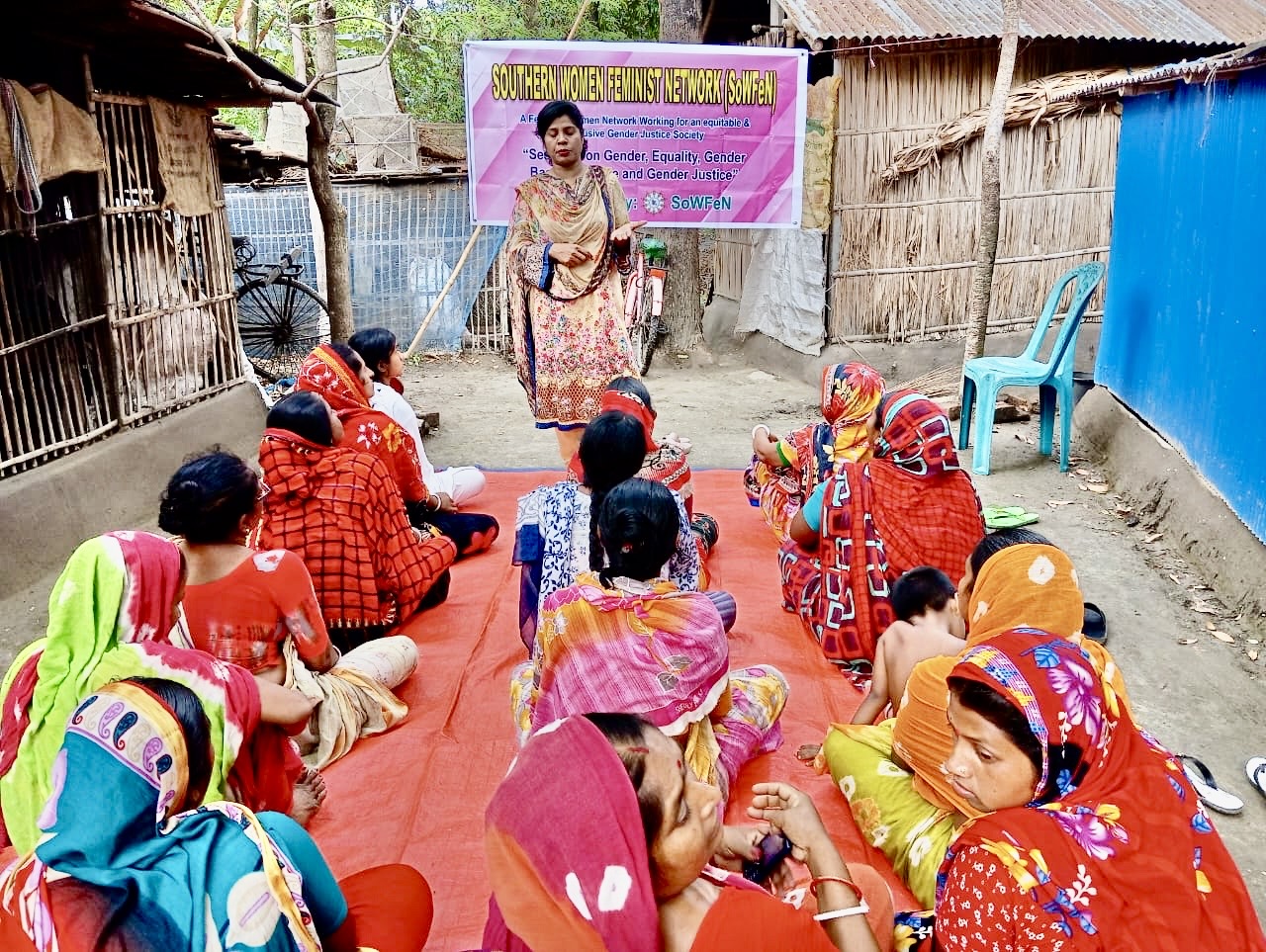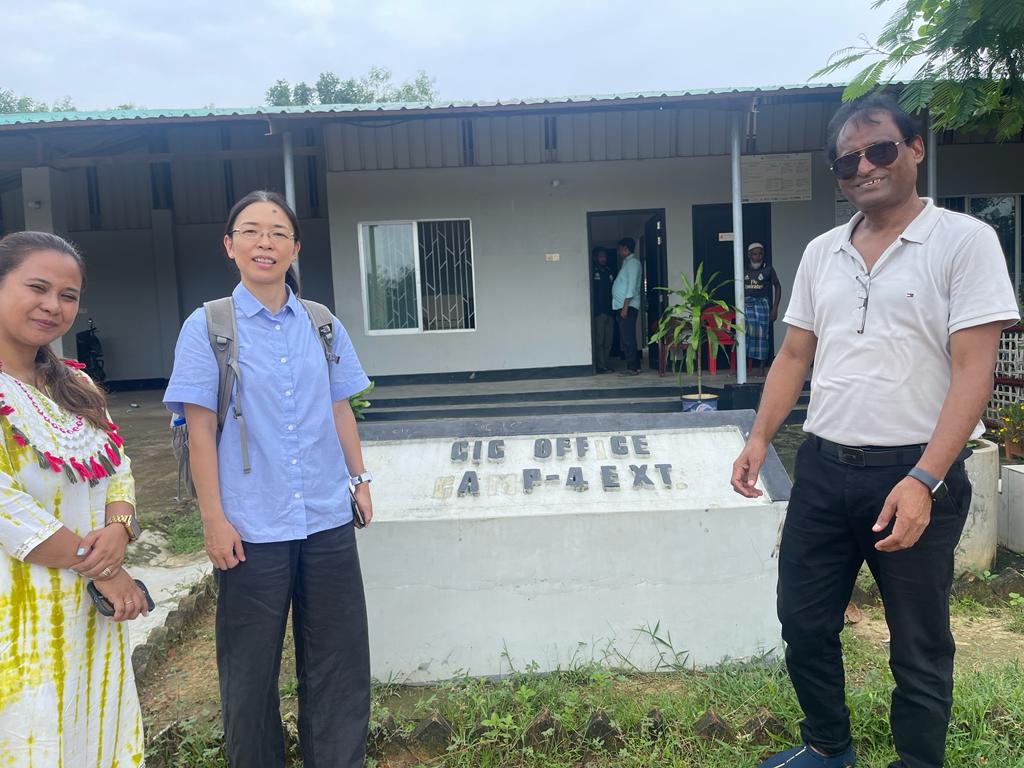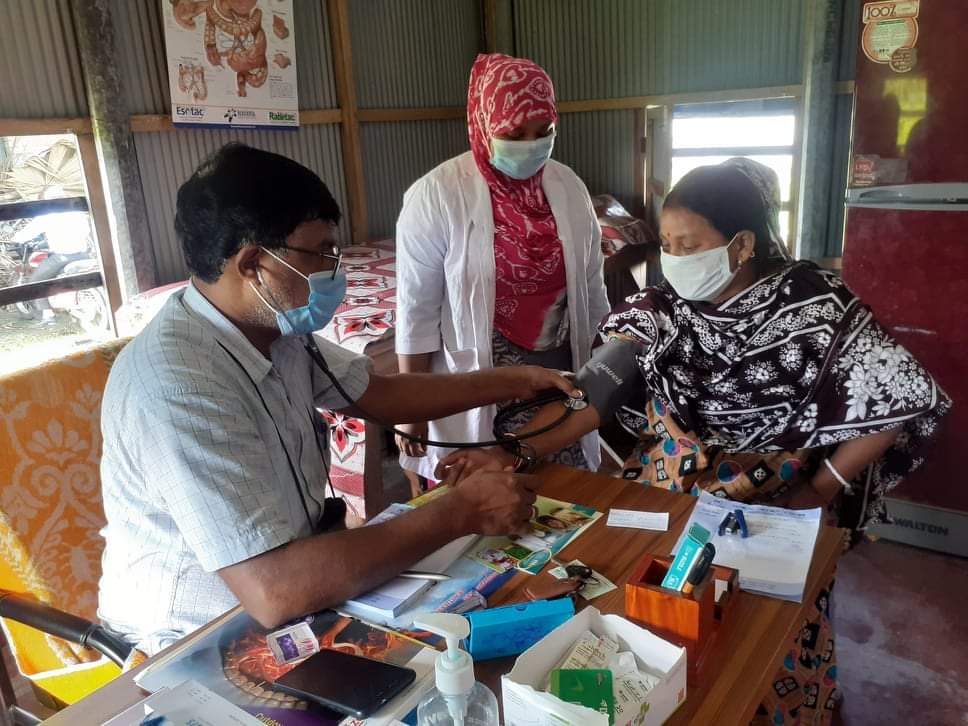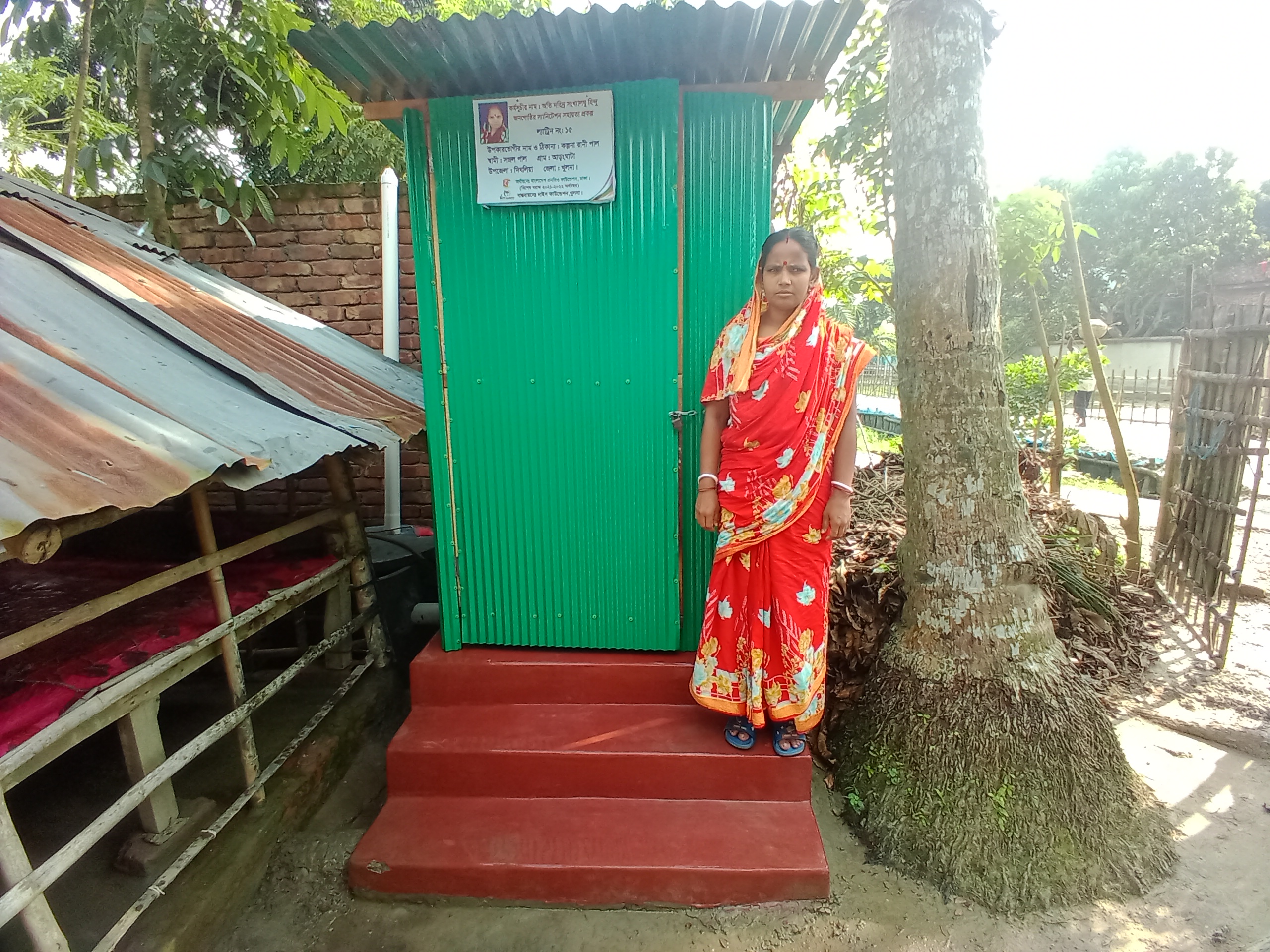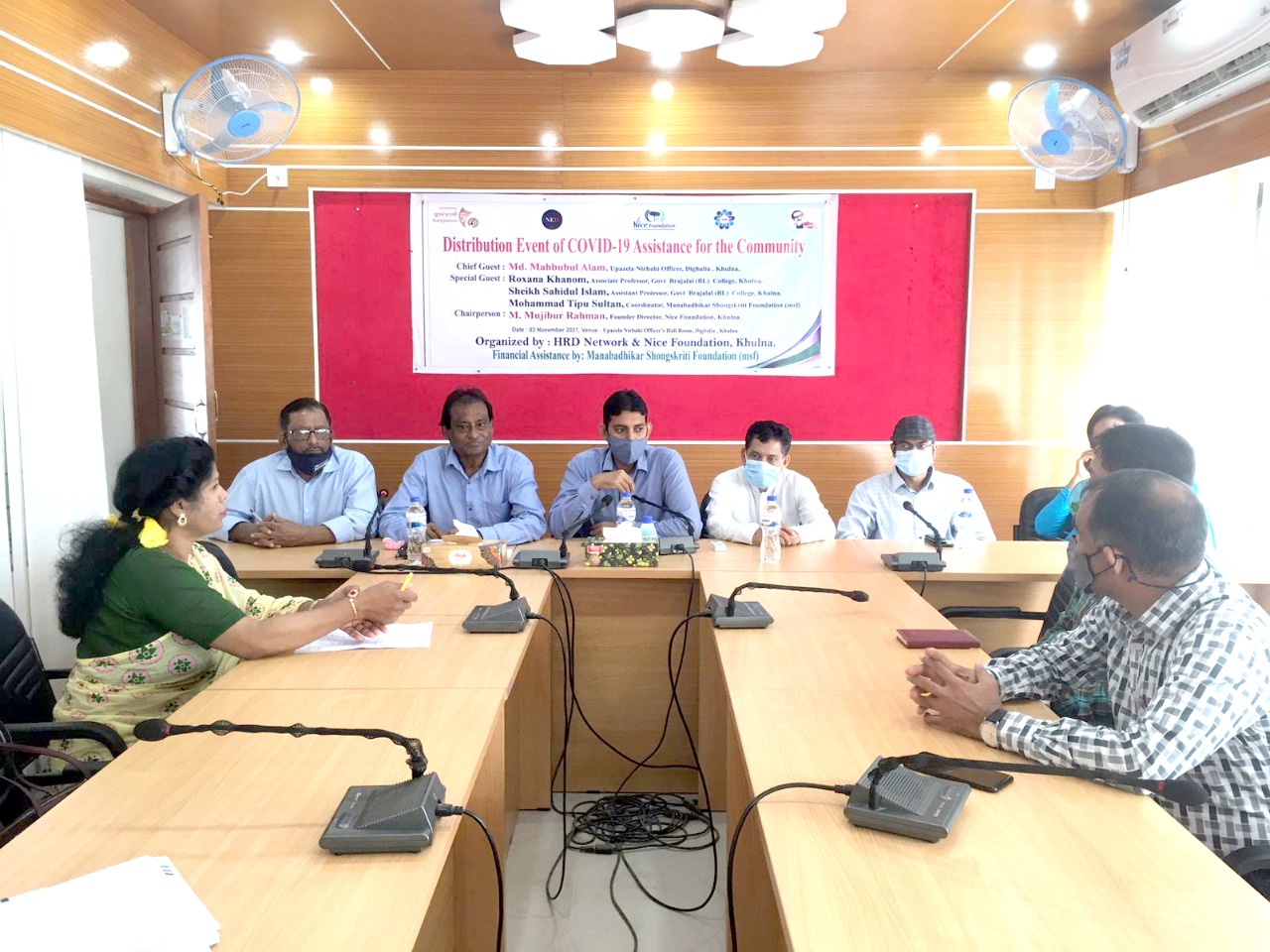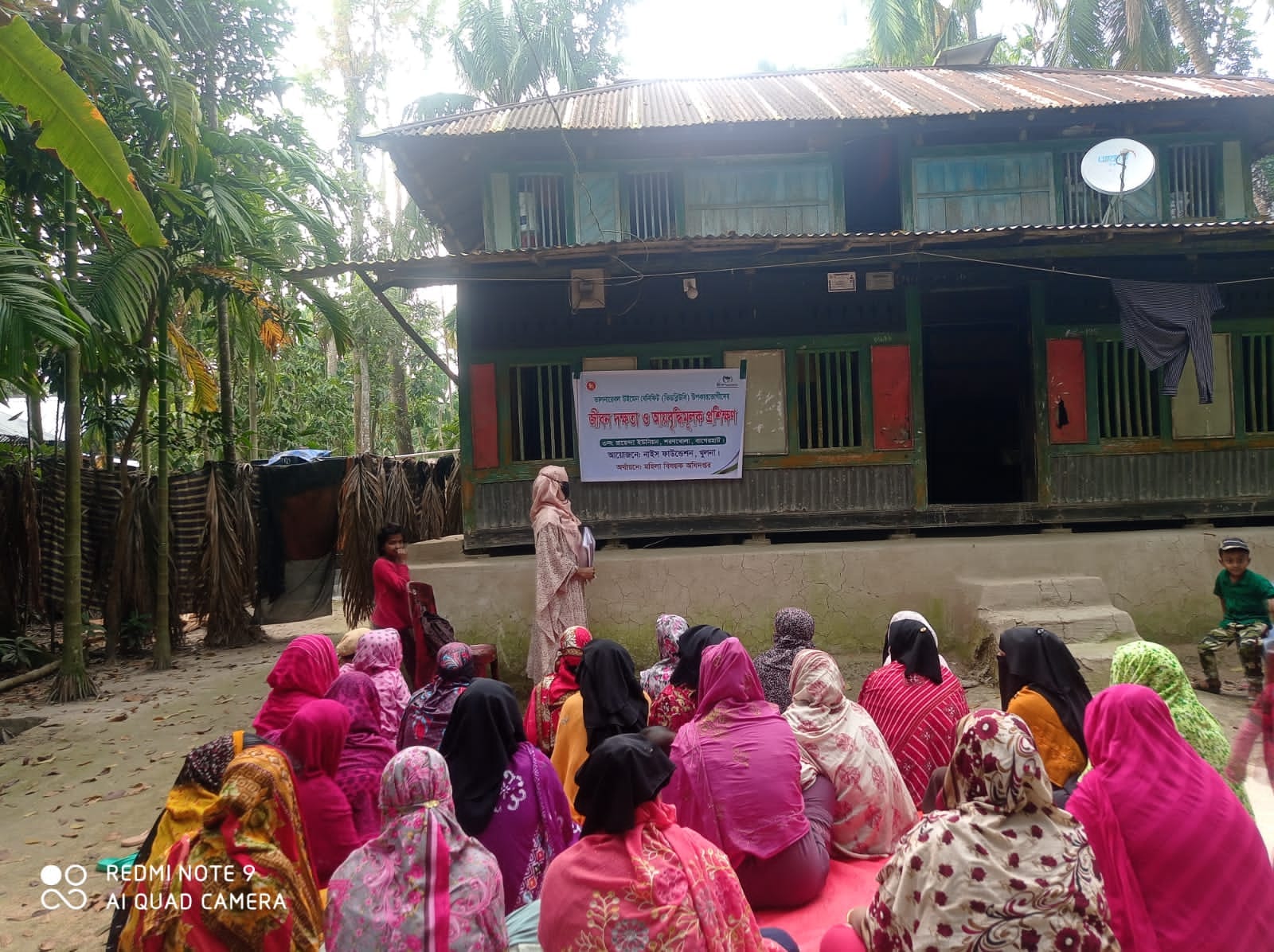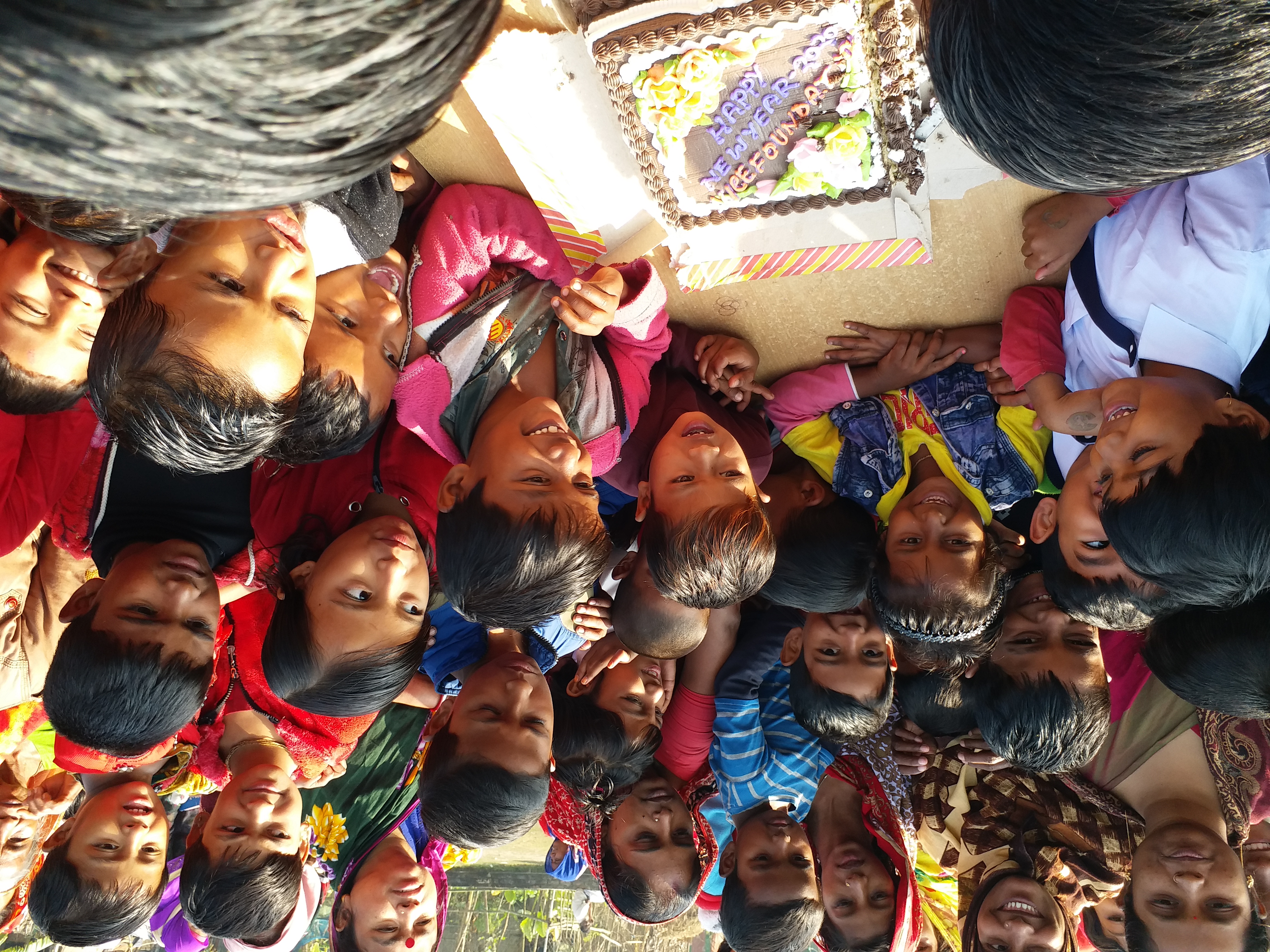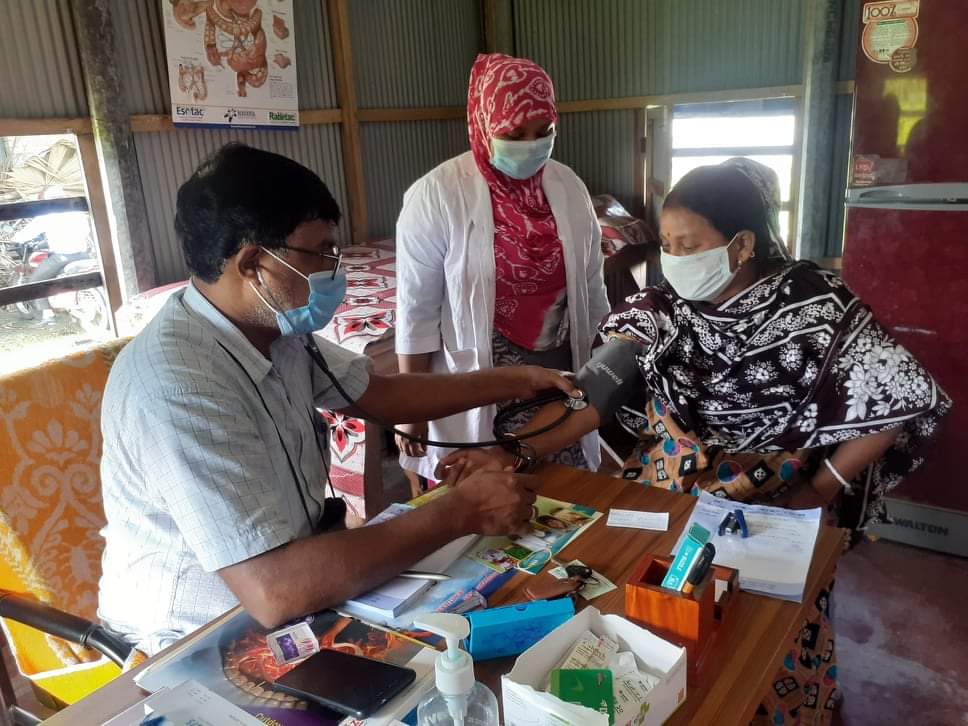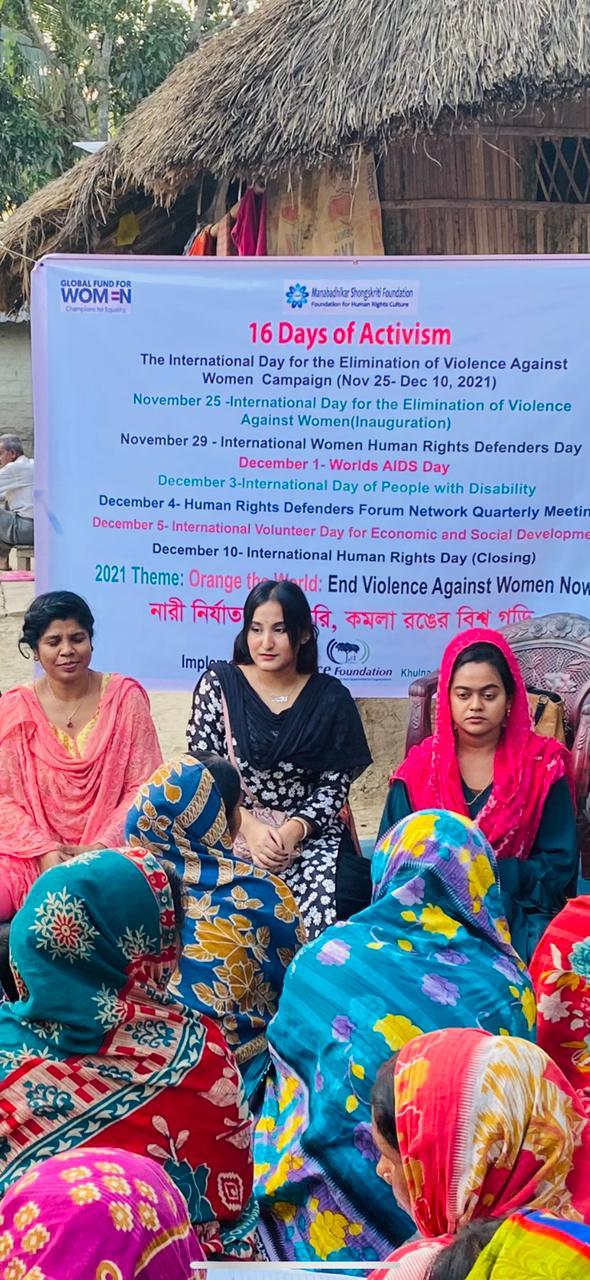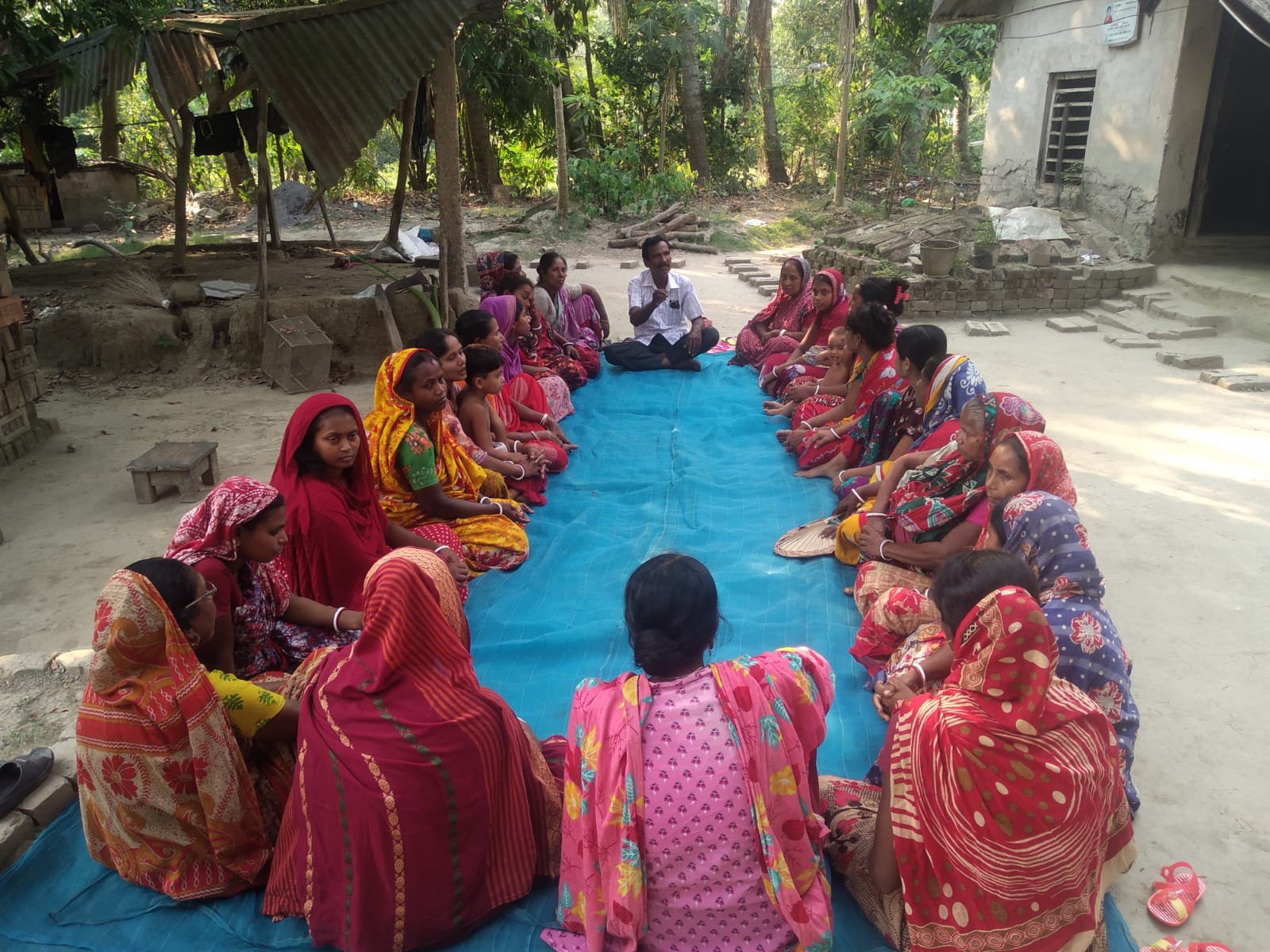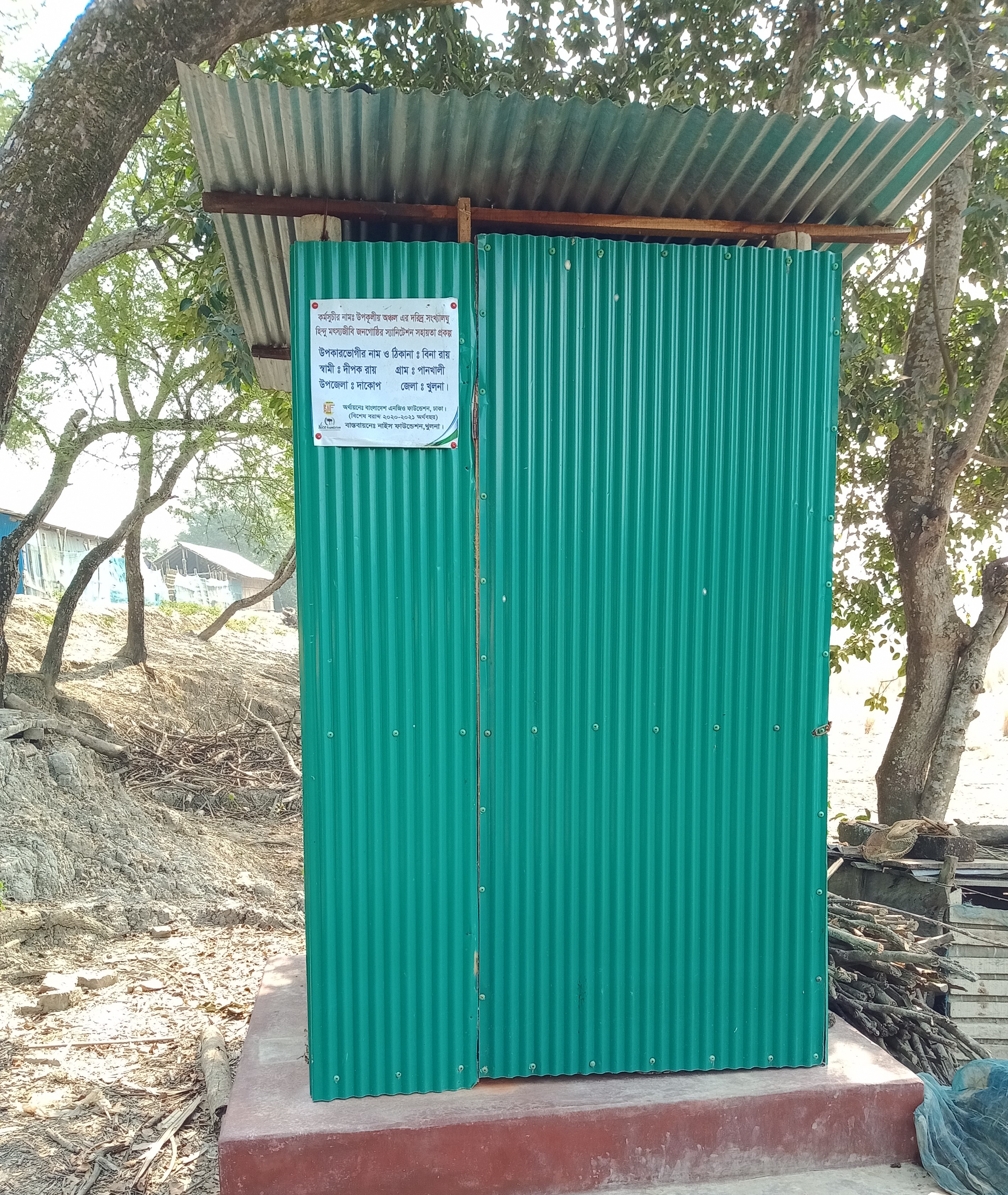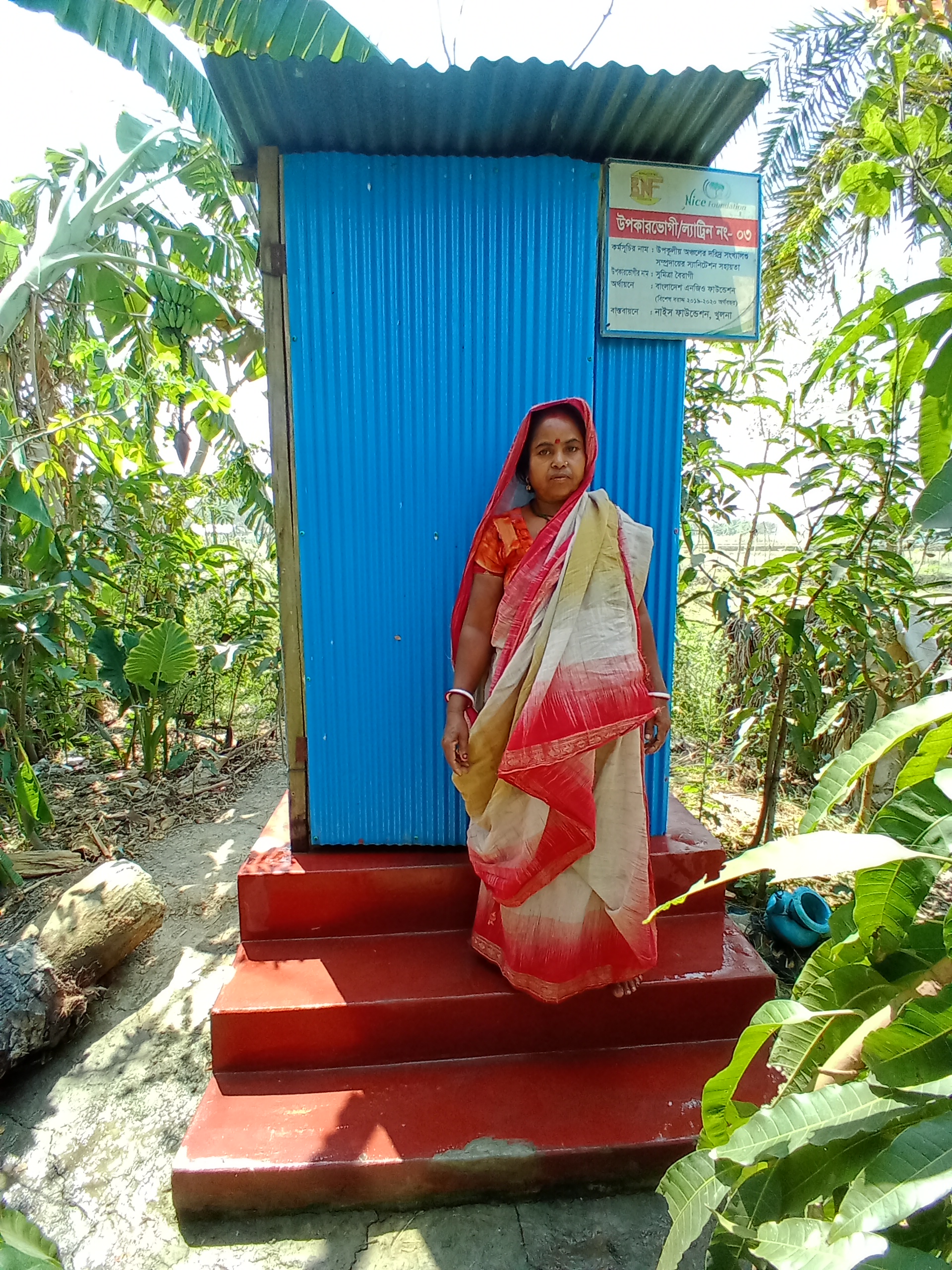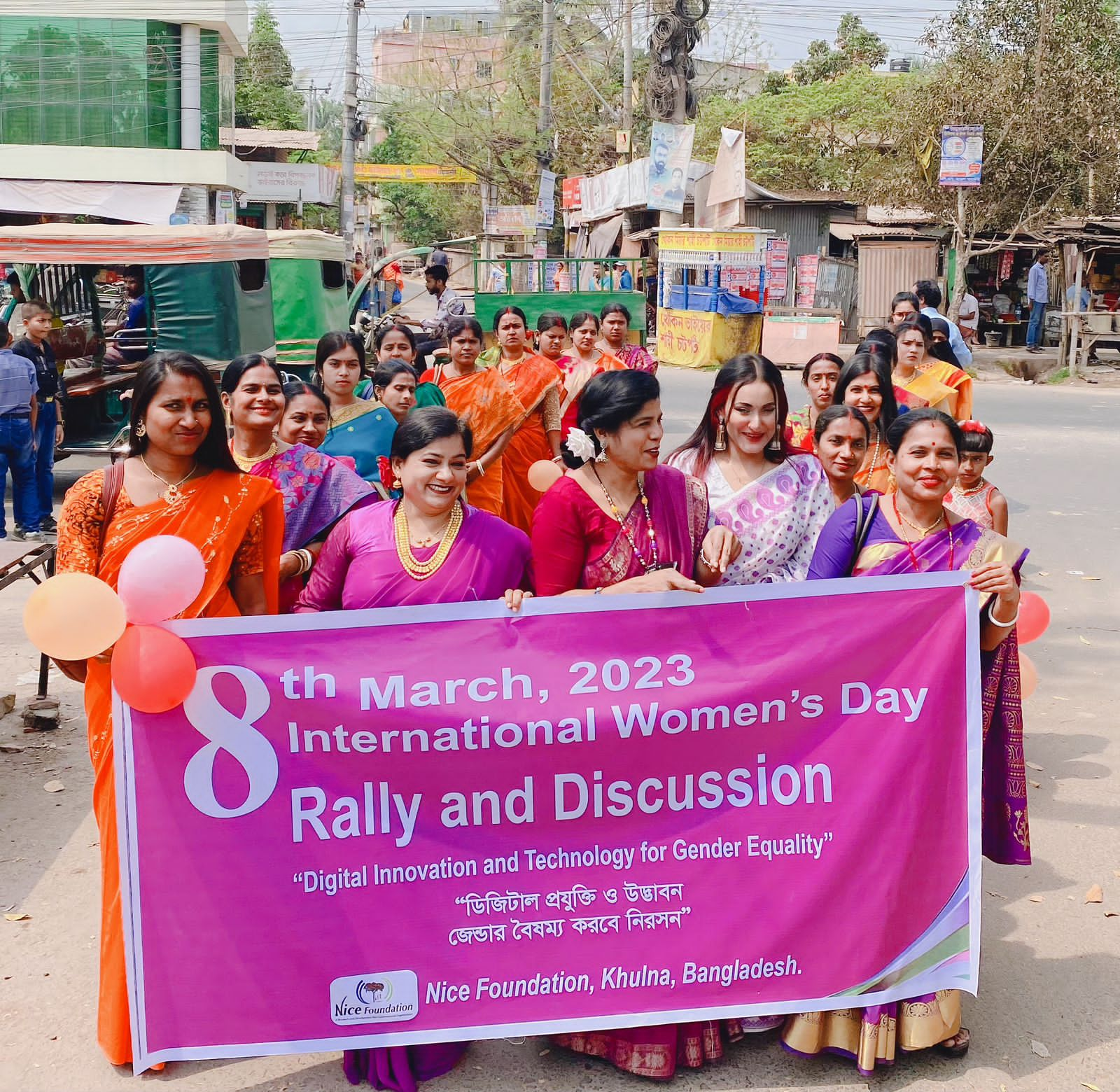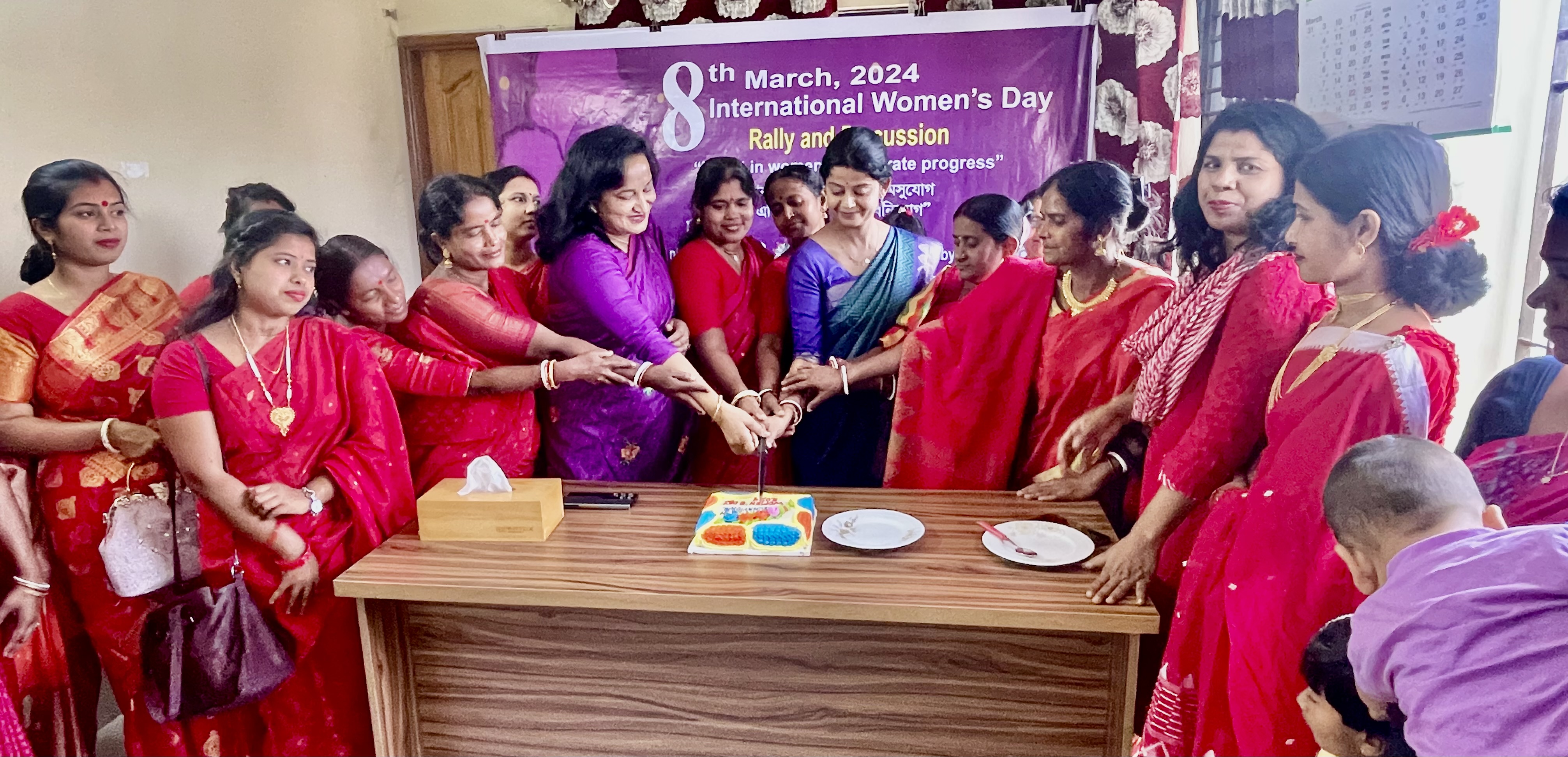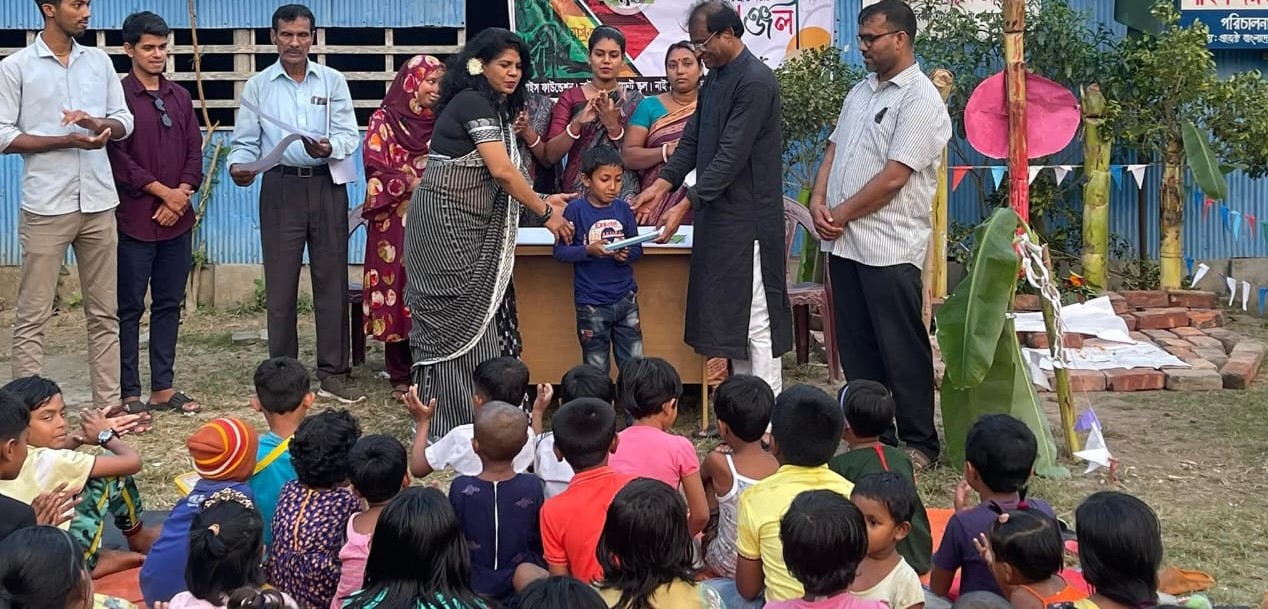
Project
Hindu Minority Women's Development Project
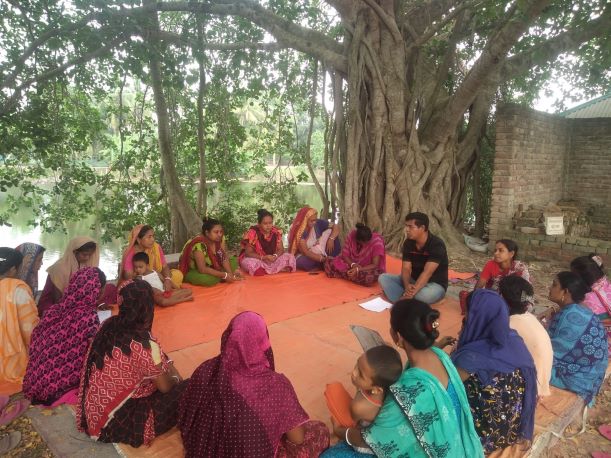
South Asian Youth Women Leadership and Mentoring project phase - ii
Global Fund for Women, USA has been funding this project initially for 3 years and has been extended for another 2 years as a phase-ii upto April 2023.1. Young women are becoming our leaders of the future and learning that working together is much more powerful than working independently.
One of our key programmes is to promote property rights to empower rural women and reduce poverty. Traditionally, women in minority communities have had no access to property rights in rural Bangladesh. We particularly focused on this issue as part of our YWL programme. Through CREA, a team of ten YWL women team been part of a capacity building programme including training, meetings, guidance, workshops and team development. Training has included leadership, group management, mass movement, and sexual and reproductive health rights, with the aim of forming a cohort ready to meet the challenges of the many social issues women face in the country. In addition, ten female staff took part in a YWL leadership programme. They will be our leaders of the future. Two are already providing support to Ms. Rabeya Sultana (responsible for the GFW-funded project), able to deputise for her when necessary.
Women from our YWL group and from the wider community held meetings about the need to promote women’s property rights with the local community, arranged a workshop with stakeholders, had meetings with policy makers, prepared advocacy papers, and collected public signatures on the issue, submitting it to divisional commissioners, MPs, Whip and the Office of Prime Minister. It was a significant success.
The key learning point for us, and more pertinently for all the young women involved, was that, while they may not be able to change the world on their own, when a group of women from our YWL and community young women’s leadership (CYWL) programmes work together under the mentorship of CREA, a sense of confidence and clarity of purpose makes things achievable.
2. The importance of wider networking
The benefits of organisational networking are also apparent to our YWL cohort. Again, taking forward our promotion of fair property rights and women’s and children’s rights more generally, we joined the National Human Rights’ Defenders Network run by the Manabadhikar Sangskriti Foundation, a human rights organisation. Our YWL and Community YWL (CYWL) cohorts have initiated many activities to organise local people, including regular women’s groups, adolescents’ group, mobilising local elected bodies, local government, political leaders, lawyers, journalists, members of parliament, whips, NGO leaders and progressive women who speak on women’s rights. We are also in the process of joining the UN Human Rights’ Defenders Network in Dhaka. We have formed a 35-member Human Rights Defenders Committee to focus on violations of human rights and raise them in national and International forums. The Committee will have monthly meetings to review and agree actions.
We could not have initiated this if we had not been a part of a wider network. If the different human rights bodies, activists and organisations can be united then any big issues can be overcome.
3. It is possible to change an organisation’s whole culture and management approach, as we have found with our GFW funding.
From the outset, GFW has promoted us as an organisation, supported us in various ways to capacitate women, develop our management board, and pursue a transformation process. We have changed a lot inside our organisation. In our early days, we had predominantly male membership and management. Now women are very actively participating in the whole process of leadership. Last year Ms Lutfunnessa Hira was running the organisation. She is now unwell and has had to step down although she retains the important role of adviser. Ms Rabeya Sultana was promoted to the role in her place, supported by Ms Angela Gomes and Ms Lutfunnesa Hira. Our organisational capacity has been strengthened enormously by the support of CREA and GFW and we have reviewed our financial policy, gender policy and our training manuals. We have continued to develop our mentorship process and restructured our management, including on our board. So, through the whole process of mentors in YWL Phase 1, we now have women staff who can continue to manage the organisation at all levels included as our head.
2. Please share your plan on how you will continue and build on the accomplishments from Phase I:
2a. Please choose options below how your proposed community project relates to Phase I
To be completed
2b. Please describe the community project for this Phase II.*
In YWL Phase I, we focused on minority women’s rights issues. Women identified a number of issues in which they wished to concentrate their advocacy for policy change. With the mentoring support of CREA, we set up a YWL team who worked hard on their capacity building opportunities. They in turn set up and worked with a team of ten CYWL leaders. They built on the traditional work of the Nice Foundation – to promote the rights of religious minorities, especially the Kawra community – the pig farmers who are untouchables because of their profession. In these communities, 80% of women have no properties rights, only 5% are literate, and around 60% have an average monthly income below 1,700 takas (around US$ 20).
These communities are deprived of fair justice and social status. Some take up pig-rearing as a profession, as pork has a large market among Hindus, Christians, foreigners and, in Dhaka, international hotels. However, pig-rearing is not accepted by the majority Muslim community. Pig rearers therefore have to hide their pigs and rear them out of the sight of the general public. Moreover, many pigs die of unknown diseases, as the Government does not have treatment facilities. Class and status gaps create discrimination, resulting in a loss of self-confidence. Majority communities possess Kawra lands illegally and control their resources. They have no opportunity to participate even in the lowest local government structure. They are not accepted on managing committees of schools, markets and in other social institutions. They are not allowed to participate in any decision-making processes in the region. It is women who bear the brunt of this disadvantage. The UNDP Gender-related Development Index (GDI) ranks Bangladesh at 123rd position out of 174 countries. The ranking is the result of the women’s low literacy rates and their low share of earned income.
The Nice Foundation has been promoting the rights of the women of the Kawra community by addressing the wide range of social issues which affect them: early marriage, reproductive health rights, and property rights. After the success of our work in YWL Phase 1, when a strong base was established strong base conceptually as well as practically with local people, stakeholders and policy makers. We will put the lessons we have learnt into practice in YWL Phase II – in the same local authority district but in a different, adjacent sub-district, where 80% of minority women have no paternal property rights. We will continue to nurture the ten CYWL groups we set up in Phase 1, and set up ten new CYWL groups in ten villages in the new sub-district. All these groups will be capacitated through training and meetings following CREA mentoring processes. The CYWL groups will be trained and will undertake the activities tried and tested in Phase 1. Gradually the new CYWL groups will take over responsibility themselves for taking forward their work
The following major activities will be implemented during the two years of phase II:
(i) Capacity building to promote YWL and promote women’s property and other rights
• Strengthening the minority women including pig farming women community through the original ten groups with 300 women, and setting up and building the capacity of then new groups, also with 300 women (totaling 600 women);
• Conducting monthly meetings with 600 minority women through the 20 women’s groups – for organising, capacity building, counseling and mass movement on minority women’s property rights;
• In order to review the monthly targeted progress and planning for next months a bi-monthly meeting with 10 CYWL and new 10 CYWL will be organized by the Field Facilitators under the mentorship of Project YWL;
• In order to build leadership capacity, a five-day training session for 20 CYWL women will be arranged in Year 1, with a further two-day course in year 2;
• A day-long orientation for 20 CYWL women will take place on action plan development, group management, mass movement, advocacy, issue-based discussion, day observance and creating village level CYWLs;
• In order to strengthen their networking and effectiveness, YWL will arrange quarterly meeting with support groups (Human Rights Defenders, Human Rights Commission, Land office, and human rights NGOs, among others.)
• In order to engage local people, village courtyard sessions will take place organised by the Field Facilitators under the mentorship of Project YWL;
• The CYWL and YWL will jointly organise events and observe different days including World Women's Day to improve its visibility as women’s activists;
• In order to build the capacity of women, a 3-day training session on human rights, minorities rights, early marriage, dowry and human trafficking will be arranged for 60 minority women leaders from 20 groups;
• In order to promote sound decision-making process and to raise awareness of equal rights issues and gender equity a three-day training session will be organised for 40 minority women;
• Networking with other activists and fact-finding reports will be generated on women rights, properties rights, gender-based violence and human rights;
• Sessions with minority adolescent girls will be organised on women’s rights and property rights (ten sessions each year, each for 20 adolescents);
• Advocacy meetings, petitions and position papers will be prepared for submission to policy makers and law makers;
• A divisional-level stakeholders workshop will be arranged to generate support for issue-based advocacy on property rights;
(ii) Management, monitoring, training and forward planning
• Regular project monitoring will take place along with field visits by management; and project progress will be shared with board members and donors.
• A group of YWL women will be identified for additional staff training on human rights and policy advocacy;
• Monthly progress and monitoring will shared with staff, YWL groups and mentors;
• The project’s organisational policy and strategic plan will be reviewed and developed for the next five years;
• Staff performance, project results, and transparent management of funds will be overseen (as per constitution) by board members, reporting to members’ meetings and the AGM;
• Publicity for this work and its results will be arranged.
• The YWL and Head of organization will participate in all the events, training, workshop, seminar meetings and organize mass movements and present project progress in quarterly board meetings. They will liaise with CREA mentors and implement action plans under their guidance; they will prepare monthly, quarterly, annual and project closing report as per GFW MoU.
2c. How does this community project align with your organisational goals?*
In phase I, we ensured that the initiative was distinctively interactive and knowledge-attaining, exuding positivism about our goals of developing young women leaders. The Nice Foundation’s aim is to develop a congenial society for the underprivileged community especially religious minority women by building the capacity of those groups. GFW supported YWL capacity development programme is one of the most important interventions for our organisation to create a cohort of young women leaders in society. The first step of capacity building for both the organisation and the community was undertaken by Nice Foundation with the mentoring support of CREA. CREA has developed an excellent tool to capacitate and enhance YWL which is also a milestone for Nice Foundation. This in turn will help ensure the work is sustainable under the leadership of young women leaders. The mentoring system is a learning and knowledge dissemination process which has helped to establish Nice foundation as a national NGO in Bangladesh. This process of capacity building is a tested tool for changing society. Our participation in the whole YWL process has contributed significantly towards achieving our organisational mandate.
2d. What are the responsibilities of the nominated young woman leader in this community project? *
In the phase II project, the responsibilities of the nominated young woman leader will be:
• Implementing the GFW-funded YWL project as per project documents and CREA mentorship actions;
• Displaying strong commitment to sustained gender equality , women's and girls' rights;
• Working with women and adolescents to ensure community engagement;
• Playing key roles for empowering girls and young women;
• Playing leading role in creating young women activists;
• Following the guidance of CREA mentors to strengthen the process of empowering women and girls including tackling gender discrimination, social norms and practices, awareness building on gender equality in communities, and organizing them for movement building;
• Playing a key role for the organisation on intersectional approach to understanding issues of gender and sexuality;
• Participating in CREA training;
• Arranging village orientation sessions on women rights and movement building;
• Organising training for CYWL groups;
• Facilitating monthly meetings of CYWL groups;
• Arranging mass movements on advocacy issues;
• Liaising with relevant stakeholders for advocacy;
• Preparing monthly, quarterly, yearly and project closing reports.
• Other activities that needed by the project as well as by the organization
2e. Please briefly describe your plan in monitoring the progress and impact of the community project?*
In order to ensure an effective monitoring system, each activity will be systematised with some time-specific success criteria from the very beginning. The Programme Officer will look after the project at implementation level and will guide and make policy decisions to execute the project quantitatively and qualitatively. After every month the achievements will be measured against those time bound success criteria. Any deviation will be recorded, positive or negative, and the causes identified so that any necessary corrective/confirmation measures can be completed in the next month. The Co-ordinator will be responsible for day-to-day supervision of the field facilitator, who in turn conduct group meetings and CYWL activities.
The Director, Ms Rabeya Sultana, will steer the staff monthly meeting, manage, guide, support and deliver CREA’s intentions. She will visit the field every month and on behalf programme Coordinator also will visit the field monthly basis to ensure implementation of tasks as per plan.
The Nice Foundation believes in participatory monitoring and evaluation and practices those for all ongoing projects and will follow gender sensitive systems at all times, including discussion groups, training, seminars, workshops on rights mass movement (following the Covid19 rules). There will be:
• Regular monitoring of project activities and key indicators;
• Monitoring tools and methods; and
• Analysis of authenticity of field data of the community to ensure the project goal and purposes
Throughout the monitoring, assessment and internal evaluation system we will ensure the progress and impact of the community project.
• What kinds of support will you provide to your nominated young woman leader to assure her meaningful participation in the initiative? This also includes technical support for virtual meetings in light of COVID-19 pandemic.*
As at phase I, we will extend a range of support and facilities to the Young Women Leaders for meaningful participation in the YWL initiative. The organisation will secure appropriate office accommodation, with furniture, laptop, wi-fi connection, modem and vehicles for field visits. Safe transport will be provided, including for travel in challenging and risk area (with male staff support where circumstances make that necessary in a largely patriarchal society). She will enjoy the salary and benefits (direct transfer to her Bank account) as per organisational policy. For any kind of virtual meetings during the pandemic she will be provided with all equipment and ensure online facilities.
• Will your organization have a shadow young woman leader in place or propose any other method for continuing the investment in young women's leadership? *
Yes, as we did at phase 1, we plan to engage other young women staff to work alongside Nusrat Jahan like phase. We are proposing two women field facilitators who will be engaged and capacitated as one of the YWL. (One of our women staff in that role has secured a post in BRAC, a large local NGO, but we have arrangements in place for appointing staff).
• How will the young women leaders and your organization, as a result of participating in this initiative, contribute to gender justice movements? *
The Nice Foundation has an organisational mandate to address gender equity and equality. We have activities on gender-based violence against women. Organisationally, gender is a cross-cutting issue which we address in all our mainstreaming activities. We believe that gender justice is a systemic redistribution of power, equal opportunities, and access for people of all genders through the dismantling of harmful structures including patriarchy without discrimination. We are located in an area under constant threat from the climate – flooding and cyclones – and we also fight for climate justice. However, through the whole process of YWL there will be a significant change in gender justice movement.
• How would you ensure continuity of young women's leadership within your organization? *
It was a great opportunity in phase I to develop a group of young women leaders in the organisation as well as the ten very active CYWL groups in the community. Our HR policy and facilities are updated in order to retain potential women staff. We are also flexible for the women who are separated, divorced and widowed. Through the whole process of capacity building, facility improvement, creating working environment and creating them as one of the YWL, our women staff’s position in our the organization is secure.
• How do you plan to sustain young women's leadership and your ongoing work in the community after the end of this Phase II?*
Sustainability is a long-term process. As a human rights organisation, we have strong base at grassroots level and our CYWL group leaders, stakeholders and staff are all mutually supportive in all the work we undertake. YWL processes are now embedded in our organisational strategies and women leadership transformation processes are part of our modus operandi. Our objective is to build the capacity and empower minority women and secure their social and economic rights. The women beneficiary groups are facilitated such a way that they can develop and empower themselves which will sustain among them. This will be supported by networking them with local government, institutions and service providers so that the initiatives are sustained long term. The Nice Foundation will continue follow-up actions with the community.

